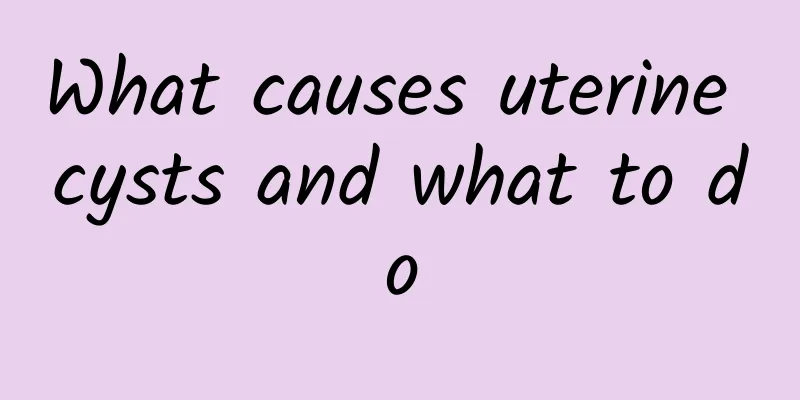What causes uterine cysts and what to do

|
The formation of uterine cysts is usually related to genetic factors, external environmental influences, physiological hormone dysfunction and other pathological reasons. According to the specific cause, a variety of methods can be selected, such as drug treatment, surgical intervention or lifestyle adjustment. 1) Genetic factors Some women may be more susceptible to uterine cysts due to a family history of genetic diseases. For example, if family members have a history of polycystic ovary syndrome or hormone disorder-related diseases, the risk of disease may also increase. In this case, regular gynecological examinations are essential. When the family history is significant, it is recommended to have an annual ultrasound examination starting at the age of 20 to detect possible lesions early. 2) Environmental factors Long-term exposure to certain harmful substances or stress may increase the risk of uterine cysts. For example, bad habits such as smoking, excessive drinking, and a high-sugar and high-fat diet can have adverse effects on hormone levels and increase the likelihood of cysts. Improving living environment and habits are important preventive measures, such as quitting smoking, controlling weight, maintaining a light diet, and staying away from environmental pollution sources, which can help reduce the risk of disease. 3) Physiological hormone problems Abnormal hormone metabolism is one of the common causes of uterine cysts. When estrogen levels are too high for a long time and progesterone secretion is insufficient, endometrial tissue may proliferate abnormally and form cysts. In this case, oral contraceptives can be used to regulate hormone levels, and the doctor can monitor hormone secretion. Commonly used drugs include Diane-35, short-acting contraceptives, etc., but they must be taken in accordance with the doctor's advice. 4) Pathological diseases Some pathological factors may also induce the formation of cysts, such as chronic inflammation (such as pelvic inflammatory disease), tumor lesions (such as cystic degeneration of uterine fibroids), etc. In such cases, surgical treatment is more common. Both laparoscopic surgery and laparotomy are suitable for larger uterine cysts, while ultrasound-guided puncture and aspiration can be selected for small cysts to relatively reduce invasive damage. 5) Traumatic or surgical sequelae After childbirth, abortion or other gynecological surgery, incomplete repair of female reproductive system tissues may lead to cyst formation. Postoperative care and follow-up visits are particularly important. Avoid strenuous exercise too early, stay away from high-risk infection sources, keep the vulva clean during recovery, and take medication on time to prevent infection. Uterine cysts are often caused by a combination of factors. Women with high-risk factors are advised to have regular checkups and consult a doctor if a cyst is found. For those with significant symptoms or pain, see a doctor as soon as possible to identify the cause and take targeted treatment to prevent hidden dangers from developing into more serious health problems. Through standardized treatment and health management, most women can properly cope with the challenges of uterine cysts. |
<<: Why do I need a hysterectomy for adenomyosis?
>>: What is the cause of endometrial polyps? Unmarried and not having sex
Recommend
Decreased ovarian function leads to hormone imbalance
Aging is a problem that every woman is afraid of ...
To maintain a healthy heart and blood pressure, avoid these 6 high-sodium dietary landmines!
Controlling your salt intake can help maintain a ...
What does vulvar leukoplakia look like in its early stages?
Vulvar leukoplakia is a common female genital dis...
What is the effect of Bartholinitis during pregnancy on the fetus?
Does Bartholinitis during pregnancy have any effe...
Introduction: Common methods of preventing cervicitis in daily life
Cervicitis is a gynecological disease that seriou...
How to treat uterine fibroids and ovarian cysts
The treatment of uterine fibroids and ovarian cys...
Female friends: How should you take good care of pelvic inflammatory disease?
Many female friends pay great attention to their ...
Is it necessary to have a uterine curettage after medical abortion? What are the specific circumstances of a uterine curettage?
It is not necessary to perform uterine curettage ...
How to identify biochemical pregnancy and ectopic pregnancy
How to identify biochemical pregnancy and ectopic...
How big is the uterine fibroid that requires surgical removal?
There is no fixed standard for how big a uterine ...
Still slim after giving birth? Supermodel Coco reveals her secret weight loss method
Coco Rocha, who gave birth to a daughter in March...
How long does it take for ovulation to occur after an abortion? What should women pay attention to for normal ovulation after an abortion?
Many people have unexpected pregnancies due to fa...
Which hospitals in China are the best for treating menopause?
Menopause is a common gynecological disease that ...
Expert introduction: Dysmenorrhea can be classified according to the degree of dysmenorrhea
Generally speaking, if we classify dysmenorrhea, ...
Where is the most professional place to treat cervical warts
When a patient falls ill, he or she will entrust ...









